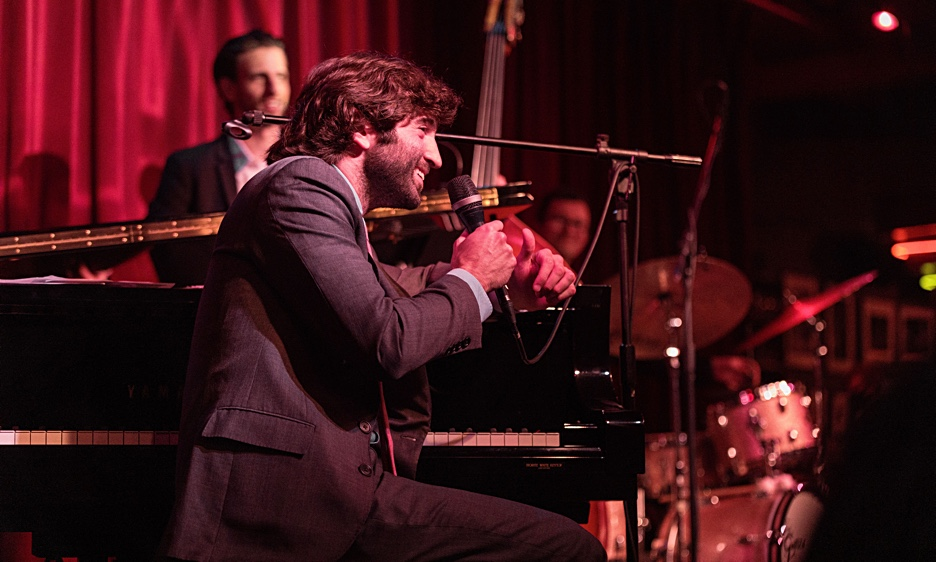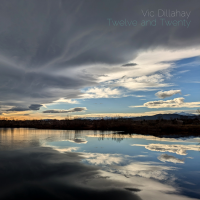Home » Jazz Articles » Interview » Joe Alterman: Swinging Success
Joe Alterman: Swinging Success

Courtesy Anna Yatskevich
There's just such depth to the music where I feel happiness in the sadness and vice versa.
—Joe Alterman
Alterman knew who he was. Hell, he was the opening act for the older gentleman.
But Alterman "knew" Les McCann even beyond that. He'd been listening to his music for years. Alterman's father was a big music fan, so he'd been exposed at an early age to good music. He started messing with the piano at age 3. Around the age of 4 or 5 he asked for lessons, which he ended up hating. But his parents wouldn't let him quit. As the years went on, McCann, Ahmad Jamal, Ramsey Lewis and Bill Evans were key influences on his development.
On that 2012 day, it was one of his heroes who approached.
"I was so excited to meet him and so nervous to meet him," recalls Alterman. "I was sitting at the piano and he came up. I was expecting a greeting, but he didn't say anything. All he said is, 'Play me some blues, boy.' And I got really nervous. But I played for a few minutes. And after two or so minutes, he said, 'Amen.' Then and I knew I was doing okay."
"He said, 'What's your name?' I said, 'Joe Alterman.' He said, 'Are you a rabbi?' I said, 'No.' And he said, 'Are you Hebrew,' and I said, 'Sure.' And he said, 'From now on, you're my He-bro.' And that was literally the start of our friendship."
Alterman recounts that story from his home in Atlanta, where he has opted to stay, unlike many young musicians who gravitate to New York City or close by because it's still the jazz hub. He's speaking of his new CD, The Upside of Down (Ropeadope, 2021), his fifth. But conversation drifts to the men who made an impact on his playing, whom he speaks about with reverence.
"I think I heard so much of myself in his music," Alterman says of McCann. The relationship has developed beyond the mentor-student thing. McCann, in difficult physical shape with diabetes and complications arising from it, can't get to the piano anymore. But the two men speak on the phone.
"It started out as a mentor relationship. And it still is, but now it's definitely more of just a close friendship ... There's something there personal. We just really connect. With our humor and kind of spiritually. Basically, when he has an idea for a melody, he'll call me and he'll sing it to me. And I'll write it down and record it," says Alterman. The song "Don't Forget to Love Yourself" on the new recording came about that way.
In the CD liner notes, McCann speaks about Alterman thusly: "For the last few years, because of my inability to stand up, I've been forced to live my life on my back looking up, unable to play my piano every day, unable to paint and to draw. But one thing I could do is talk to my number one buddy down in Atlanta ... The more we talked the more we got to know each other and we shared everything. To me, it's like having a beautiful brother ... In fact, I was telling my close associates that my life was complete and that I'm ready to go back home to God. But every day I talked to Joe, and every day I was uplifted. I went to a zone I wasn't even thinking about. I've always been a God-loving person, but this was something right in my face. Every time I talked to Joe, it was an eye opening experience ... The more we shared and connected with each other, the more I realized, 'How can I miss this?' I want to be around to watch it happen to him like it happened to me, for I see the ultimate greatness in Joe."
The mutual respect is much appreciated by Alterman, whose good-natured aura and calm demeanor belie the intensity of his music.
"I grew up loving Les' music. It really opened up a lot for me. I was in college, in jazz school, and a lot of the stuff that you were told you can't do in school, Les was doing. It sounded so good. Before we even met, his music opened me up."
Alterman's sound and approach is buoyant. So is his conversation and positive attitude. Hints of Jamal, Lewis and another hero, Wynton Kelly can be heard. He takes that kind of uplifting, bouncing sound and sculpts it into his own thing. It's difficult to not pat your foot. It's intricate yet swinging, with striking shifts in the sound dynamics. He can bring the music down to a hush, then spring back to a sweet, strolling-down-the-street experience.
"I love piano players that have a happy sound," he says. "Like Gene Harris. A little blues and leave some space. Dynamics. Those are really the ones. Erroll Garner drew me in. I think the first ones that really drew me were Erroll Garner and Ahmad Jamal.
The Upside of Down was recorded at Birdland in November 2019 and later in February 2020, just before the coronavirus pandemic shutdown. The trio includes Nathaniel Schroeder on bass and Marlon Patton on drums, musicians he hooks up with when he plays New York gigs. There is music by Oscar Peterson, Henry Mancini and others.
Says Alterman, "I really lucked out that we recorded that. But I was definitely pleased with the gigs and how things came out. I don't really love recording in the studio. We lucked out. I almost didn't record it. Then we wouldn't have had anything to put out this past year."
"I pretty much like to do a mixture of original songs, standards, and then some kind of lesser known songs written by the people who wrote the standards. Like 'Funny Girl.' People heard of it, but no one really knows the song."
With the music released, Alterman is experiencing the same thing other musicians are going through. Tours are limited and sometimes sketchy as the Delta variant of the virus circulates and different areas of the country are canceling or postponing. Some festivals are going on as planned.
"It's tricky. It's weird, because I went back to Birdland in mid-July, and it kind of felt like, 'Welcome back.'" But there have been gig cancellations. "It doesn't really feel like we're back anymore. It feels more like people are being careful," he says.
Alterman does have gigs in Atlanta. And he teaches. During COVID, online teaching and some streaming concerts helped keep things together. He'll be at Birdland in New York in January and has gigs lined up in Chicago. "A lot of good things. Just kind of, you know, working hard and seeing what sticks." In total, not bad for someone who wanted to quit taking lessons not long into the process.
"My parents wouldn't let me quit. So basically from 4 or 5 to 11 or 12, I was taking classical lessons. Not enjoying it and always getting in trouble for changing things," he says. Jazz was about to knock on the door.
"Being from Atlanta, I'd go to a lot of bluegrass festivals. Around 11, I got really into the guitarist Doc Watson, a bluegrass player. He has a song called 'Freight Train Boogie' that I was obsessed with. It's a boogie woogie baseline. And I basically asked my parents for guitar lessons because I wanted to learn that." He got his wish.
"I'm taking guitar lessons and my guitar teacher is telling me, 'Boogie woogie music is written for the piano. You can play the piano.' So it kind of got me back interested in the piano. But also what really got me into jazz was going to these bluegrass festivals and hearing songs, you know, traditional songs like 'You Are My Sunshine.' Then hearing what Oscar Peterson or Monty Alexander would do with the same songs I was hearing at these bluegrass festivals," Alterman says.
"It was amazing to hear what the jazz guys were doing to the songs I already knew. So it wasn't the solos that initially drew me to jazz. It was the really cool things the jazz guys were doing with the melodies that I was familiar with."
As far as deciding to pursue music—that part was still unclear.
"I always just wanted to play. So I just wanted to get gigs so I could play. And this was when I was a teenager. And so I guess, you know, by the time I left for college, I was out playing gigs. And I just kept, while I was in college, trying to get more gigs. I found after a few years that I was a professional," he says, bemused by the outcome. "I never knew where it was gonna lead, but I knew I wanted to study it and pursue it ... I kind of feel like it's what I'm supposed to do. What I'm meant to do."
Even his high school experience had a bit of happenstance, in a comical way. There was no jazz band or program at that time. "I convinced them to start a jazz band because I really wanted them to. I remember I got to the first rehearsal and there's no bassist and the song they handed out to everyone was 'Disco Inferno.' It really wasn't a jazz band," he recounts, laughing. It didn't dim his enthusiasm or lessen his drive.
"I was just so motivated by hearing people like Oscar Peterson, Les and Ahmad Jamal. I was practicing so much before I got to New York. I loved it," he says. He ended up in the music program at NYU. In Manhattan, he practiced by day. At night he would go see jazz greats in clubs like the Village Vanguard. He says he would learn about someone in class, then at night end up talking to them to get first-hand stories from people like Cedar Walton and James Moody. "It was really exciting to learn about the history and then confirm the history with the people we were learning about."
After college, Houston Person was the first notable gig. Then he opened for Ramsey Lewis at the Blue Note. Alterman says he became "in a way, the go-to opening act at the Blue Note. I was an intern there, a college intern. They kind of put me into this opening act thing. And so first I opened for Les, but I opened for Ramsey like five or six times. That was a big thing for me. But I love jazz. I love comedy. I did a jazz and comedy night with Dick Gregory, which was one of the really special nights in my life."
It was mostly trio gigs and he was playing important clubs. Then he started recording under his own name and drawing more notice. He's had a solid career.
"But I think that for me a big thing was actually figuring out where I wanted to live. And realizing that I wanted to live in Atlanta. It was tricky because a lot of people were telling me it was gonna be bad for my career," he says. But he got important guidance, again through a hero.
"People like Ramsey Lewis were so encouraging saying, 'Go where you're going to be happy and it'll reflect in your music.' It kinda really has. I feel like before I moved back, I was playing in New York like six nights a week. If I was playing at somewhere like Birdland, it would have been hard to draw an audience because I was playing so much. And so now when I come to town every few months, people come out. So I feel like moving has been good. Not only for me personally, because I'm happy. But it's better for the attendance at my shows, too, because I'm not playing in New York as frequently. If that makes sense."
Alterman is content with playing jazz and continuing to explore fun, obscure tunes, while spicing it up with original material. He doesn't lose people by racing away from form or melody. His chops and his attack on the instrument are infectious.
"I guess the first thing that really drew me (into jazz) was the cool things people like Ahmad were doing to the melodies. They were interpreting. Master interpreters. So I love that they take the melody and how they make it more beautiful. They do things with it I never thought were possible. So that was really the first thing. But I really resonate with—first of all the feeling. I love the happy, joyful feeling. But I also like how when I'm sad, or the music is sad, you can also feel some happiness in it. There's both of those things there," he says.
"That quote, I forgot who said it, but it hurts so good. There's just such depth to the music where I feel happiness in the sadness and vice versa. It's been very helpful in my life in many ways. But besides that, I love listening to it. I can't exactly put into words why I love it so much. But it just feels so good."
Tags
Interview
Joe Alterman
R.J. DeLuke
United States
Les McCann
Ahmad Jamal
Ramsey Lewis
Bill Evans
Wynton Kelly
Gene Harris
Errol Garner
oscar peterson
Monte Alexander
Cedar Walton
Houston Person
PREVIOUS / NEXT
Joe Alterman Concerts
Feb
22
Sun
Stream
Support All About Jazz
 All About Jazz has been a pillar of jazz since 1995, championing it as an art form and, more importantly, supporting the musicians who make it. Our enduring commitment has made "AAJ" one of the most culturally important websites of its kind, read by hundreds of thousands of fans, musicians and industry figures every month.
All About Jazz has been a pillar of jazz since 1995, championing it as an art form and, more importantly, supporting the musicians who make it. Our enduring commitment has made "AAJ" one of the most culturally important websites of its kind, read by hundreds of thousands of fans, musicians and industry figures every month.

























